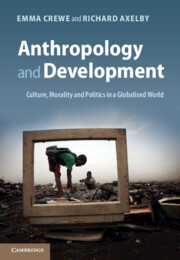Book contents
- Frontmatter
- Contents
- List of acronyms
- Preface and acknowledgements
- 1 Introduction
- 2 Anthropologists engaged
- 3 The social and political organisation of aid and development
- 4 The elusive poor
- 5 Human rights and cultural fantasies
- 6 Hierarchies of knowledge
- 7 The moralities of production and exchange
- 8 The politics of policy and practice
- 9 Imagining the future
- Appendix: challenging questions arising from this book
- Notes
- References
- Index
5 - Human rights and cultural fantasies
Published online by Cambridge University Press: 05 November 2012
- Frontmatter
- Contents
- List of acronyms
- Preface and acknowledgements
- 1 Introduction
- 2 Anthropologists engaged
- 3 The social and political organisation of aid and development
- 4 The elusive poor
- 5 Human rights and cultural fantasies
- 6 Hierarchies of knowledge
- 7 The moralities of production and exchange
- 8 The politics of policy and practice
- 9 Imagining the future
- Appendix: challenging questions arising from this book
- Notes
- References
- Index
Summary
Key points covered by this chapter
Universal Human Rights have become an influential organising principle for government, development and aid.
Within development agencies certain aspects of identity are accorded priority. These aspects of identity are recognised in certain ways and take on particular forms within a framework of human rights.
Anthropologists have problematised the idea of universal rights through listening to the diversity of perspectives, and dynamism of life experiences, of various rights-holders.
Through an examination of child rights theory and practice, we show how assumptions underlying rights can ignore context, specificity and dissent.
Child protection projects provide a case study of the limits to rights frameworks, including their bias towards individuals rather than groups.
The way that communities are constructed, by development agencies but also by communities themselves, reveals that they and their rights are cultural and contestable, rather than natural and beyond dispute.
In the mid 1990s the international donor community realigned their policies to place a new emphasis on the promotion of globalised human rights. No longer were human rights an indicator of a certain level of development; now rights were seen as a device that could be used to actively promote development. The interlinking of human rights with development and poverty reduction aims has now been adopted by multilateral agencies, such as the UNDP (1998), and bilateral agencies, including SIDA (2001) and DFID (2000). USAID includes the advancement of human rights and freedom as the first bullet point in its vision. At the UN 2005 World Summit, member states made a commitment to integrate the promotion and protection of human rights into national policies. Even the World Bank, having initially sheltered behind the ‘non-political’ clause of its articles of agreement, has recently moved to include guarantees of civil and political rights within its poverty reduction strategies. National and local-level non-governmental and civil society organisations have been mobilised to advance claims to particular rights. The practical impact of this new fashion has been a repositioning of goals away from ‘welfare and wellbeing’ and towards ‘rights and responsibilities’. Development is no longer to be seen as a gift to be given; it is a right that must be claimed.
- Type
- Chapter
- Information
- Anthropology and DevelopmentCulture, Morality and Politics in a Globalised World, pp. 107 - 130Publisher: Cambridge University PressPrint publication year: 2012



